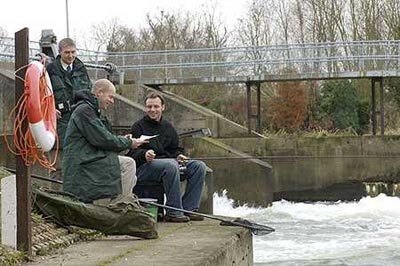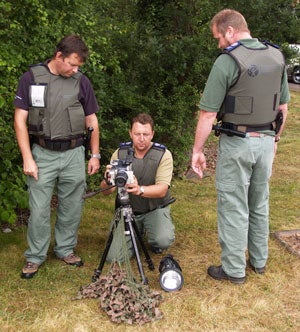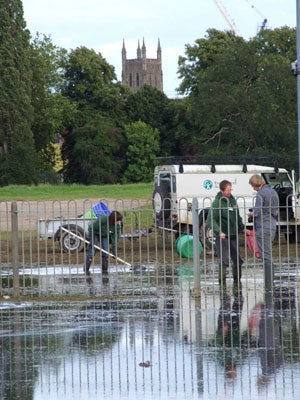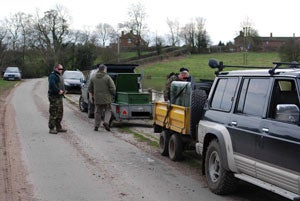YOUR Questions Answered by the Environment Agency
Many of you had lots of criticisms and questions for the Environment Agency, so we decided to start a forum thread where you could post the questions you would like to ask the EA. We compiled your questions and put them to them and this is the response:1.What can, and will be done about illegal fishing? Please see response for Question 2 2.What can, and will be done about fish thefts? We need to be clear what we mean by illegal fishing and fish thefts. Illegal fishing includes the use of illegal methods such as spear-guns and set-lines, and fishing without a rod licence. We respond to reports of illegal methods within our customer charter response times, and we do prosecute for these type of offences. We also prosecute for fishing without a licence – around 4,000 anglers a year. Fish theft is exactly that – theft, and therefore is a police matter. If fish are being caught by legal methods, but then stolen, our powers to act are very limited. However, we are doing things to help. Fish are often stolen to stock other waters without our consent; we will prosecute those caught doing this, and welcome intelligence reports that help us pinpoint this activity. We may also prosecute for fish theft where fish are being stolen through the use of illegal methods. For example, if we caught a person stealing fish caught by set-lines, we would prosecute for the illegal fishing and for theft on behalf of the fishery owner. We are also seeking improved byelaw powers so that we will be able to place strict limits on the removal of coarse fish from rivers. 3.I’d like to know why it is that I have received no response from the EA at local, regional and even national level? I’ve asked if they couldn’t use part-time volunteers to help with patrolling/enforcement, two key issues that keep cropping up. I’ve offered to do this work without reward, other than some obvious training. I’ve acted as a club bailiff in the past, and as a local councillor, I’ve had all the usual background checks carried out. Please see answer for Question 4 4.There are probably many club bailiffs out there that would gladly check rod licences as part of their duties, why not give them the chance? With regard to the use of volunteers for enforcement work: Any person to whom we issue a bailiff’s warrant and ask or invite to undertake enforcement on our behalf, legally becomes our responsibility with respect to their health and safety and with regard to any effects of their actions. Being issued a bailiff’s warrant gives a person powers and responsibilities as a police constable. Enforcing the law, even if simply checking possession of a rod fishing licence, exposes you to possibly significant risks. We take these issues seriously and seek to ensure that the people we warrant are selected, trained and equipped to be able to carry out the role of water bailiff competently and safely. To achieve this involves significant cost in both money and time. It is important that we can adequately direct the activities of our bailiffs to ensure we maintain proper management control and the individual’s safety. People warranted to undertake higher-impact enforcement work, for instance to tackle poaching, who may use the power of arrest, must be fully trained and highly professional. Even for those who undertake a more restricted role focussing only on checking rod licences, we must ensure proper training and a good level of competency.
Depending on local circumstances, such licence-checking work is undertaken either by our full-time officers or by a number of part-time bailiffs. This latter group of people often includes individuals who have acted as club bailiffs or similar and who have expressed interest in working with us or have been identified as being appropriate to the role by our local officers. We no longer issue warrants simply to interested people who volunteer. This is because experience has shown that our need to control activities and the costs of training and managing such groups makes this impractical. Having good knowledge of fishing activities on local waters (legal and illegal) is important for our teams and is one reason that we value our contact with local fishery owners and fishing clubs. Providing information including that of suspected illegal fishing is something any interested person can do by making contact with our local officers or by using our incident response line 0800 807060. 5.Why don’t the EA use their influence and consult with bona fide angling clubs to persuade the clubs to make it a club rule that members must show a current rod licence when joining or renewing their club cards? Clubs not consenting to this would then give the EA an indication of which areas are more likely to have anglers fishing without licences? It would be very helpful to us if angling clubs were to feel able to support us by encouraging and even requiring members to hold licences. We are not able to insist on or require this, but when we meet with clubs and the governing bodies we do encourage such an approach. Obviously, we continue to remind everyone of the legal requirement for the licence. 6.How many rod and line offences have the EA successfully prosecuted in the last five years?
7.Do the EA feel the fines handed out for rod licence evasion are enough of a deterrent? Those convicted of an offence will receive a criminal record in addition to any punishment the Magistrates decide to impose, which can be up to a maximum of £ 2500. Any repeat offenders will face having a ban from holding and obtaining a licence for a period not exceeding 5 years. Magistrates also have the ability to forfeit an offender’s equipment. The typical fine is about £ 50 but we have seen cases recently where the fine is higher, and we welcome this. 8.Why can’t they put daily river levels on their web site as a service for us licence paying anglers? This is a service we aspire to offer and in the next year our Water Resources Department will undertake a scoping study to determine the costs involved and the possible routes for it to be undertaken. We will decide upon the best way forward depending on the results of this study. In the meantime, we are able to offer information on river levels for five of our regions by telephone. Rivercall operates in the following regions using a standard telephone number with the last two digits being specific to the region in which you may want information (e.g. for North East the number to call is 0906 619 77 22). This service operates at BT premium rates (generally 60p per minute). We receive some additional income through this service that is directed to fund fishery projects. Subject to our decisions on a service on the web, we are considering extension of the Rivercall service to include our Thames Region.
9.How many people have been caught fishing without a licence in the last three years?
There are many anglers who are not able to produce a valid licence on the bankside and our officers issue offence reports to them. They do however subsequently produce valid licences so no further action is taken against these anglers. These figures have not been included in the above table. 10. How many have been caught committing fishery offences in the past three years? How many of those were British and how many weren’t?
We do not record the nationality of the offender. 11.What assurance can you give that in response to the recent catastrophic flooding South Yorkshire and Humberside, that there will be no return to insensitive flood protection work such as the dredging and uniform channelling of rivers and destruction of bankside vegetation? We are continually developing our approach to managing flood risk. Increasingly we work through catchment flood management plans that aim to identify the most sustainable means to control flood risk for each river system. All major capital schemes for flood protection undergo a strategic environmental appraisal aimed at minimising environmental harm. Maintenance operations are conducted to agreed standards including for protection of conservation and fisheries. The Water Framework Directive will also give further protection to the physical habitats of watercourses.
12.Why don’t you send out bailiffs when you have been informed of anglers fishing without a licence? We cannot always respond immediately to reports of anglers fishing without a licence; that is not always practical or cost-effective. But we do concentrate our enforcement efforts where licence evasion is high, and any reports we receive will help us target licence dodgers. 13.Taking fish by foul means is at an all time high, why don’t you think it is a problem? We do recognise the problem. We will prosecute anyone caught using illegal methods such as set-lines or nets to take fish. But we have to catch them first. Fishery owners, clubs and anglers can help us track down the culprits, by reporting this type of activity. If we can respond immediately we will, but if not we will still use the intelligence to focus our enforcement where it’s needed. People new to fishing or to fishing in this country may not be aware of our laws, in particular the methods that they can use. We also play a role in providing information including in different languages and also through major employers of workers from other countries. Fishery owners also need to make it clear to permit holders whether they do or do not allow fish to be kept from their water. 14.Why don’t you sell Rod Licences in tackle shops that are open longer and at weekends when the post office is closed? The administrative burden means it is not cost effective to sell rod licences through independent tackle shops. By selling licences through a main contractor we can offer a higher quality service with increased coverage, high accessibility and cost effective methods of sale. In addition to the Post Office we also sell rod licences over the telephone, online and through a small number of bank side agents, all of these methods are available at weekends and in the evenings. 15.Why waste valuable money on annual flyers that don’t interest me or others? I don’t want them, so don’t you think you should provide a no junk mail box to tick when I annually purchase my EA rod licence, and use the money for something more deserving? Our research shows that most licence holders do appreciate our annual magazine for licence holders. They both read and respond to it. What’s more it generates rather than wastes money. How? By both encouraging people to go fishing and reminding them to buy a licence. Our licence sales have risen by more than 16 per cent since 2000 when we started sending the magazines out. That money goes back into our fisheries work. Before that sales had been falling for three years. Of course, it is difficult to pitch a paper magazine that covers the interests of the huge range of ages, tastes and angling expertise. If you don’t want a paper magazine sent to you then you may want to buy your licence on-line. We’ll send you an internet magazine instead at a fraction of the cost and you can always opt out. You say that the magazine has nothing of interest but the last issue contains, amongst other things, the answer to question 18 below. From the huge upsurge in hits on the internet angling guides we promoted in this year’s magazine – now well over 100,000 hits a month – many people appreciated that article. For on-line sales and information on where to go fishing, have a look at: 16.What action should I take at 3am in the morning when I stumble across six people in two boats pulling two nets across my river? As it happens, no club own it, it is ‘free’ fishing. I assume the riparian land owner is the local council, so what should I do? On coming across suspected illegal fishing: Our advice to anyone seeing what they suspect is illegal fishing activity is to avoid becoming directly involved. Instead, take note of the details that might help any investigation (see below) and call the Environment Agency as soon as possible. Our incident line – 0800 807060 – is available at all times. We will respond in a manner appropriate to the circumstances and the time. Your correspondent gives the example of a number of people operating equipment in the early hours of the morning. This is activity that we would want to hear about and to have the opportunity to address. We would not necessarily be able to respond directly to such reports on every occasion. To manage a situation as described properly and safely we would require a team of professional officers with appropriate vehicles and equipment and we might determine a need for police support. Fielding such resource at the hour described could not always be done in time to catch the offenders. Alternatively we might be able to arrange a police response. We certainly want to know of such activities so that investigations can be set up with the chance of taking enforcement action, even if this is later on. >
We have made the (probably safe) assumption that the activity described (netting at 3am) would be illegal. It is worth noting that other examples that you may see as suspicious could be legitimate and with our authorisation. Prompt reporting allows us to check. When anyone observes suspected illegal fishing please try to note and record:
We will not insist but it helps a lot if we know who you are and how to contact you. We would like to be able to report back to you with the outcome of our investigation. Even if the situation means we are not able immediately to tackle an incident of illegal fishing, your report is still very important. It allows us to build a picture of activity that can help us successfully tackle a problem subsequently. 17.What is the situation regarding the river closed season for coarse fishing? Is this due to be reviewed/discussed and if so, when? We have no plans to review it at present. The close season exists to protect fish during the breeding season, and any changes must be based on sound science rather than opinion. We have considered undertaking research but have decided that it would be expensive and possibly inconclusive. Our most recent market research showed that 55% of river coarse anglers favoured a close season, and in view of that we do not feel that expensive R&D is justified. 18.How many freshwater anglers are there in England & Wales (coarse & game)? It rather depends on what you mean by an angler. Is it someone who goes every week, every month, every year or every decade? As reported in our magazine for anglers:
For more information see the ‘Public attitudes to Angling 2005’ survey on: 19.How many annual licences are sold in England & Wales? Last year we sold 1.28 million licences, 925,000 of these were annual. 20.How many anglers buy two annual licences to allow them to fish with more than 2 rods? We don’t routinely access this information from our database, but hope to be able to in the future with improvements planned for our computer system. |
Welcome!Log into your account














